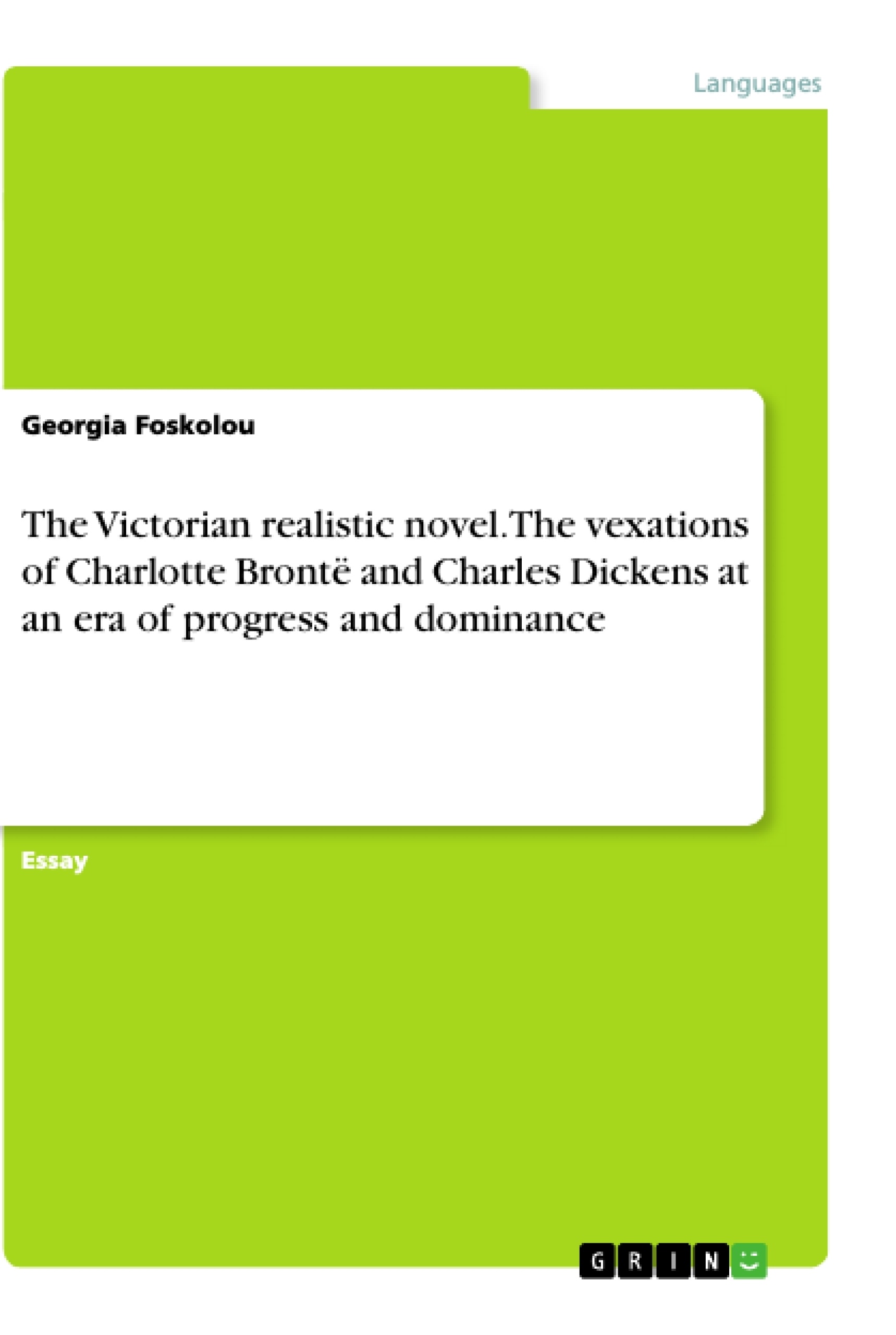This essay discusses how Capitalism, Colonialism and Gender inequality are depicted in Jane Eyre and Great Expectations.
The era from the enthrownment of Queen Victoria in 1837 to her death and the end of her reign in 1901, namely the Victorian era, was a time where great changes in society, economy and politics occurred in Britain, which shaped both Britain and the world as we know it today and of course impacted the literature of the time. (Wukovits, 2013) At a large scale, the literary work developed and published in the Victorian era moved away from the romantic and chivalry genre to the realistic genre, which is a mode of writing, which appears as if it is faithfully representing reality, presenting characters who are ordinary people set in unremarkable circumstances and ordinary environments and are struggling with social complexities in their environment. The Victorian realistic novel functions as a fictional microcosm where through the social struggle of these imaginary characters, the sociopolitical changes of the real Victorian society and their adverse effects are reported, imbued with the hope of the author that eventually the social issues they brought about will be resolved if they are brought to the light. (Moran, 2006) This paper will present how the financial and industrial progress along with the political dominance of the British Empire inside of Britain and to the British colonies affected Charlotte Brontë in the writing of Jane Eyre and how the social adversities of industrialization affected Charles Dickens in the writing of Great Expectations.
Inhaltsverzeichnis (Table of Contents)
- The Victorian realistic novel: The vexations of Charlotte Brontë and Charles Dickens at an era of progress and dominance
- The industrial revolution, the Victorian era, and the rise of the bourgeois
- The impact of industrialization on Charles Dickens’ “Great Expectations”
- Colonialization: Britain's expansion and the exploitation of native populations
Zielsetzung und Themenschwerpunkte (Objectives and Key Themes)
This paper aims to explore the impact of the Victorian era’s industrial and colonial advancements on the realistic novel, specifically focusing on the works of Charlotte Brontë and Charles Dickens. The essay will delve into the social and economic transformations brought about by the Industrial Revolution and the consequences of British colonialism. The authors' depiction of class struggles, social injustice, and the exploitation of the working class will be examined.
- The rise of industrialization and its impact on Victorian society
- The emergence of a capitalistic economic system and the exploitation of the proletariat
- The role of colonialism in shaping British wealth and its moral implications
- The portrayal of class struggle and social injustice in the Victorian realistic novel
- The consequences of the Victorian era’s transformations on individual lives and societal structures
Zusammenfassung der Kapitel (Chapter Summaries)
- The Victorian realistic novel: The vexations of Charlotte Brontë and Charles Dickens at an era of progress and dominance
- This section introduces the context of the Victorian era, highlighting the significant social, economic, and political changes that occurred during Queen Victoria's reign. It establishes the transition from romantic and chivalry genres to the realistic genre in literature, emphasizing the portrayal of ordinary people facing social complexities.
- This chapter delves into the Industrial Revolution, its impact on Victorian Britain's economic system, and the rise of capitalism. It explores the exploitation of the working class by the bourgeoisie and the adverse social consequences, particularly emphasizing the plight of the proletariat in Charles Dickens' "Great Expectations."
- This section examines the role of colonialism in shaping Victorian Britain's prosperity and its connection to the exploitation of native populations. It highlights the moral dilemmas associated with colonialism and the experiences of enslaved natives in places like Jamaica, particularly focusing on the Christmas Rebellion and the abolition of the slave trade.
Schlüsselwörter (Keywords)
Key terms and concepts explored in this paper include Victorian era, realistic novel, Industrial Revolution, capitalism, bourgeoisie, proletariat, colonialism, exploitation, class struggle, social injustice, “Great Expectations,” and “Jane Eyre.” These terms represent the major themes and research focuses, highlighting the intricate connections between social, economic, and literary developments during the Victorian era.
Frequently Asked Questions
What are the characteristics of the Victorian realistic novel?
It faithfully represents reality, featuring ordinary people in unremarkable circumstances struggling with the social complexities of the Victorian era.
How does Charles Dickens depict industrialization in "Great Expectations"?
Dickens explores the adverse social consequences of the Industrial Revolution, focusing on class struggle, poverty, and the exploitation of the proletariat.
What role does colonialism play in Charlotte Brontë's "Jane Eyre"?
The novel reflects the financial progress and political dominance of the British Empire, often linking wealth to colonial exploitation and moral dilemmas.
What is the "rise of the bourgeois" in the Victorian era?
It refers to the emergence of a powerful middle class driven by capitalism and industrial advancements, which fundamentally changed British social structures.
How did gender inequality impact Victorian literature?
Authors like Brontë highlighted the limited choices and social pressures faced by women, using realistic fiction to report and challenge these injustices.
- Quote paper
- Georgia Foskolou (Author), 2019, The Victorian realistic novel. The vexations of Charlotte Brontë and Charles Dickens at an era of progress and dominance, Munich, GRIN Verlag, https://www.grin.com/document/498950



